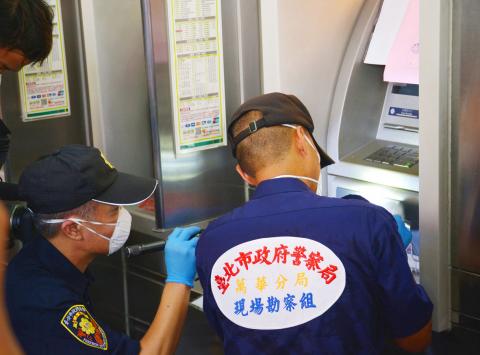State-run First Commercial Bank (第一銀行) yesterday denied allegations that its employees were involved in last week’s automatic teller machine (ATM) hacking incident, which led to the theft of more than NT$83 million (US$2.5 million).
“An internal probe by the company did not reveal evidence suggesting that the theft was an inside job,” First Commercial Bank president Chou Po-chaio (周伯蕉) said at a news conference following a question-and-answer session with the legislature’s Finance Committee.
The allegations that rogue employees were involved in the hack arose because First Commercial Bank was the only institution targeted among the many banks that use the same Wincor Nixdorf ATM model.

Photo: CNA
Chou said the company respects prosecutors’ efforts in investigating the case and that it has been cooperating with authorities.
Based on the bank’s latest tallies, suspects involved in the ATM heist had tampered with 41 machines and made off with NT$83.27 million in cash, higher than the NT$70 million it had estimated earlier.
Chou said it took the bank some time to tally losses at ATMs not installed at the bank’s branches, as the process must be conducted with the company’s security and surveillance service provider.
The bank did not attempt to downplay the severity of the heist, he said.
Taipei police on Thursday said they were looking at the possibility that an international organized crime ring was involved in the ATM hacking.
The police said they were tracking down six suspects, most of whom were from Eastern Europe.
There are no Taiwanese on the list of suspects, they said.
The modus operandi was similar to another heist carried out several years ago in Europe by an international organized crime ring, the police said, adding that there is a possibility of a link between the two cases.
The police said two of the suspects — identified only as Russian nationals Berezovskiy, 34, and Berkman, 28 — have already left Taiwan, while a third suspect, whose nationality is not yet known, has also left the nation.
Since no large amounts of cash were found in the luggage of the two Russians at Taiwan’s customs, police believe that the stolen money is in the hands of a Latvian suspect identified as Andrenjes and others who are likely still in Taiwan.
First Commercial Bank said that an internal probe found that the heist was committed without “inserting cards” or “handling the ATMs in any incorrect or illegal way,” but the machines were simply “spitting out” a steady stream of bills.
Chou said suspects had implanted a self-deleting software virus into the ATMs, which has made subsequent forensic investigations more difficult.
However, investigators might be able to find clues from two of the ATMs, as a passerby had alerted bank security of suspicious activity, forcing the suspects to flee before they finished collecting the cash, Chou said.
Chou apologized to the public and reiterated that an internal audit showed that the heist did not affect customers’ deposits and accounts, and that the company would take full responsibility if discrepancies are found.
Additional reporting by CNA

Sweeping policy changes under US Secretary of Health and Human Services Robert F. Kennedy Jr are having a chilling effect on vaccine makers as anti-vaccine rhetoric has turned into concrete changes in inoculation schedules and recommendations, investors and executives said. The administration of US President Donald Trump has in the past year upended vaccine recommendations, with the country last month ending its longstanding guidance that all children receive inoculations against flu, hepatitis A and other diseases. The unprecedented changes have led to diminished vaccine usage, hurt the investment case for some biotechs, and created a drag that would likely dent revenues and

Global semiconductor stocks advanced yesterday, as comments by Nvidia Corp chief executive officer Jensen Huang (黃仁勳) at Davos, Switzerland, helped reinforce investor enthusiasm for artificial intelligence (AI). Samsung Electronics Co gained as much as 5 percent to an all-time high, helping drive South Korea’s benchmark KOSPI above 5,000 for the first time. That came after the Philadelphia Semiconductor Index rose more than 3 percent to a fresh record on Wednesday, with a boost from Nvidia. The gains came amid broad risk-on trade after US President Donald Trump withdrew his threat of tariffs on some European nations over backing for Greenland. Huang further

CULPRITS: Factors that affected the slip included falling global crude oil prices, wait-and-see consumer attitudes due to US tariffs and a different Lunar New Year holiday schedule Taiwan’s retail sales ended a nine-year growth streak last year, slipping 0.2 percent from a year earlier as uncertainty over US tariff policies affected demand for durable goods, data released on Friday by the Ministry of Economic Affairs showed. Last year’s retail sales totaled NT$4.84 trillion (US$153.27 billion), down about NT$9.5 billion, or 0.2 percent, from 2024. Despite the decline, the figure was still the second-highest annual sales total on record. Ministry statistics department deputy head Chen Yu-fang (陳玉芳) said sales of cars, motorcycles and related products, which accounted for 17.4 percent of total retail rales last year, fell NT$68.1 billion, or

MediaTek Inc (聯發科) shares yesterday notched their best two-day rally on record, as investors flock to the Taiwanese chip designer on excitement over its tie-up with Google. The Taipei-listed stock jumped 8.59 percent, capping a two-session surge of 19 percent and closing at a fresh all-time high of NT$1,770. That extended a two-month rally on growing awareness of MediaTek’s work on Google’s tensor processing units (TPUs), which are chips used in artificial intelligence (AI) applications. It also highlights how fund managers faced with single-stock limits on their holding of market titan Taiwan Semiconductor Manufacturing Co (TSMC, 台積電) are diversifying into other AI-related firms.